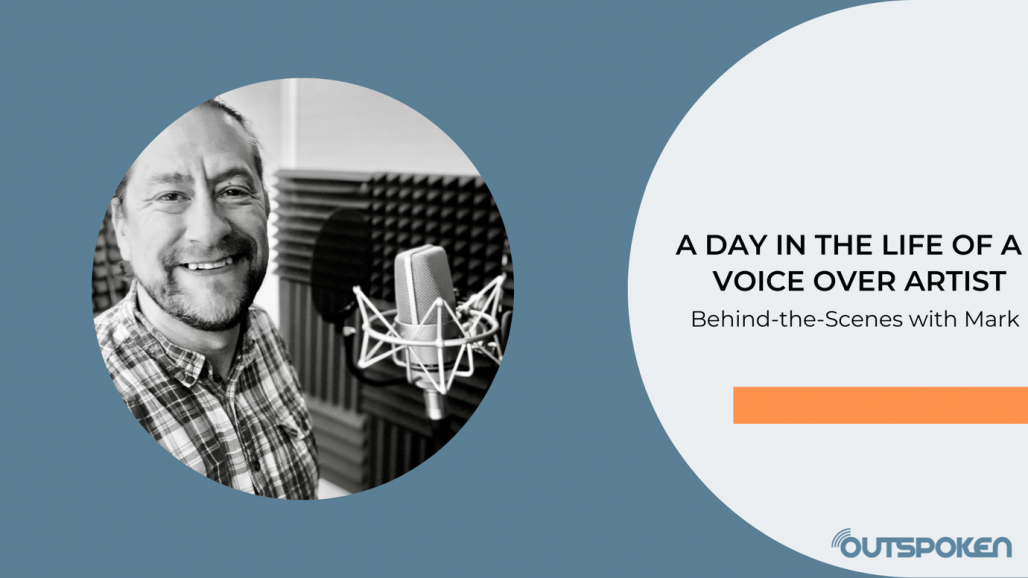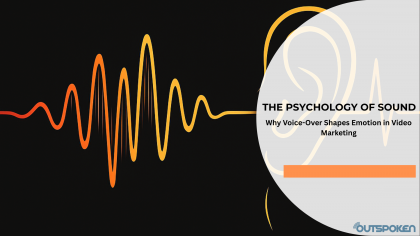Learn what makes a voice sound natural, how to brief voice-over talent effectively, and practical ca...
A Day in the Life of a Voice Over Artist: Behind-the-Scenes with Mark

Lights, camera, and...voice? That's right, in the world of voice over, the magic happens off-screen and in the vocal booth. When we advise aspiring voice over artists, we sometimes hear a question “What does a voice artist do exactly? Do they just record stuff all day?” Well, not quite all day although for some it often happens.
In order to give you a more detailed answer, we spoke to our very own talent, Mark Thomas, a seasoned voice over pro who has lent his voice to various projects from hard-hitting Amnesty International campaigns to eHarmony's welcoming notes.
Mark's day-to-day life reveals the true artistry behind the voice that speaks to millions yet remains unseen. From the first sip of morning coffee to the final click of audio editing, join us as we unveil the nuances of a day in the life of a voice over artist.
How do you kickstart your day? Do you have any morning rituals that get you in the zone for voice-over work?
Beyond the existential dread and coffee that seems to fuel Britain in 2024, I love to walk! I normally start my day around 9am. You’ll note I say ‘normally’ - what is the point of being your own boss if you can’t be a little flexible on your timings.
Before I start work, I try to get out for a short walk - around half an hour - with Classic FM in my ears. It allows me to plan my day without all the annoying vocals of other genres of music. I find myself listening to the words which puts me off.
So a brisk walk sets me up for the morning, and by the time I’m back home I’m a little breathless (No point if you don’t push yourself) so I obviously can’t get straight on recording. That gives me a little more time to flash up the studio, check my emails, work out what invoices are due for a chase (yay!) and enjoy a cuppa.
Then I start getting any auditions out the door, showing my face on socials and also some outreach to potential new clients, (a part of the job I really don’t like – it’s a necessary evil if you want to work though.)
In between all that I’ll record any jobs that have come in.
Voice acting requires skill and versatility. How do you train and care for your voice?
I’ll be honest here, I’m terrible for planning training for myself, vocal or otherwise - work always seems to get in way and when you’re a sole trader that always takes precedence.
I did manage to catch some of the recent Gravy for the Brain free training day sessions and came away with two obvious but very useful tips for script preparation and recording.
As for caring for my voice, I’m a bit anal when it comes to that. I try not to be around people who are coughing or sneezing.
I also try to not drink alcohol on the day before a planned recording session as it can cause unwanted (and frankly disgusting) mouth noises. I’m also doing Dry January this year and so far, it’s going well. <eye twitch>
I drink a lot of water during the day too which helps lubricate the old pipes and avoid dairy products which again helps avoid those annoying mouth noises.
If I did want to pursue further training, I’m sure one of the many Voiceover ‘coaches’ touting their wares these days could help - it seems every man and their dog is a ‘coach’ these days. Don’t get me started.
Can you walk us through a typical recording session? How do you prepare, and what happens in the studio?
I’d say 90% of my work is self-directed, so that normally involves me swanning into the studio in the morning and going from there, but I assume your question is about directed sessions - which I love!
Hopefully I’ve had the script through in plenty of time (haha!), so I read through that. I highlight anything I want to query with the client on the session (odd words, odd grammar etc).
Depending on how the client wants to connect (normally Zoom these days I’ve found) I make sure the App is updated to its latest version, check I’ve got the meeting link and have the script and any reference material to hand.
Then I start my DAW (Adobe Audition) and ensure everything is working ok (You’d be amazed how often things don’t) and then do a couple of read throughs of the script.
I record one of these, so the client has an extra version alongside with the ones recorded on the session. It gives them other options.
A few minutes before the session is due to start, I join it. This gives me chance to mute myself and turn off the camera (face for radio) and be there when the others join.
Then it’s an introduction, a chat with them about the script and we’re good to go.
When voicing a character, how do you delve into their persona? Do you have any techniques for getting into character?
I very rarely do character work as my niche is corporate voiceover. I do get asked to put on a specific persona for the read but I don’t class this as character work.
The brief will be something like ‘You’re Alex, he’s confused about compliance processes and is asking questions’ - so I need to be conversational with an enquiring tone etc.
Then there is the other end of the spectrum - the straight down the line corporate read. Serious, confident and informative…
…and everything else in between.
What are some of the biggest challenges you face in voice-over work, and how do you overcome them?
Finding work is the biggest challenge. I don’t think it’s a secret that 2023 was a hard year for creatives of all types and I know many of my peers had a lean time - despite what their LinkedIn life might look like.
You need to keep on top of your marketing, putting yourself ‘out there’ so when people need a voiceover artist you’re front of mind.
This, however, is easier said than done.
The voiceover industry is saturated with people now - many coming onboard since the pandemic when VO work was touted as a qet-rich-quick scheme by the media.
The main problem here is the lack of understanding of rates - which, I think, is driving a race to the bottom.
Please VO’s, know your worth…and if you don’t know what to charge, then ask - most people will be happy to help I’d hope.
Can you share a particularly memorable experience or project you’ve worked on?
One of the projects I’m most proud of was for Amnesty International for the 2018 Football World Cup. It highlighted social injustices for certain groups of people in Russia, the host, and was a hard-hitting video.
It was one of very few projects I’ve been hired for that I thought, Yeah, that’s making a difference.
Another one was a set of Explainer Videos for what to do if you discover a fire if you live in a tower block - and given what happened at Grenfell Tower this also gave me a sense of my job helping people.
What kind of equipment and software do you use, and how important are they in your work?
Ah, a hardware nerd eh? Well, here is my ‘kit list’
Esmono Recording booth (very expensive, but paid for itself many times over)
Neumann TLM103 - one of the best voiceover microphones around, and an industry faithful.
Audient ID14 audio interface - very good BUT I think it’s just died on me - thank god for my backup Focusrite Scarlett 2i2 - be prepared people!
Sennheiser Profile USB Mic - yes, it might be USB but it’s a great, quiet microphone and it’s what I use as a backup.
iMac - Hmmmm, shiny. I edit my audio on this.
M1 Macbook Air - this is in my booth running Adobe Audition. It’s fanless, so totally silent.
As for how important they are, well I literally couldn’t do my job without these.
How has the voice-over industry changed since you started, and where do you see it going in the future?
I’ve been a Voiceover Artist for over 8 years and even in my ‘short’ time, yes, I’ve noticed a change.
A lot more remote recording, especially since the Pandemic. Studios have realised that remote recording is possible and can still produce professional results when using session software like SourceConnect, ipDTL and SessionLink et al.
Pay to Play sites also saw an explosion of interest and are still the main source of work for many people. I went on a mission last year and removed myself from most of them because of their terrible rates of pay and amount of talent you’re up against.
One I’m still on regularly has over 100 VO’s auditioning which is just ludicrous, so is on the chopping board once my subscription is up.
What advice would you give to someone aspiring to become a voice-over artist?
Strongly consider the reasons why you want to do it. Ignore the media, this isn’t a route to quick riches. It takes a lot of work and commitment. That’s not to say there isn’t money in voiceover, but it takes time to build up your client base and reputation.
Also, if you’ve been told ‘You’ve got a good voice, you should do voiceover’ - yeah, that old chestnut. There is a hell of a lot more to it that having a nice voice.
Obviously, that helps, but gone are the days of ‘Voiceover Man’ style voiceover. People are looking for authenticity - which is why the conversational voiceover is in such demand.
When you’re not in the studio, what do you enjoy doing? How do you unwind?
I love hiking and being outside in general. In a previous life I had considered being a Forest Ranger, and I still have that urge to be outside when possible. Me and my siblings are goint to be hiking Hadrian’s Wall in May too.
I also love gardening, reading, good sci-fi films/programs and music of all kinds.
Sounds like an online dating ad, right? Oddly enough for many years I was the voice on the front page of eHarmony!
If you’d like to get hold of me, I’m on all socials as MarkThomasVO and voiceover demos can be found on my website – www.marksvoice.co.uk
After a day spent in Mark's soundproof shoes, it's clear that the life of a voice over artist is more than just talking into a mic. It's about connecting with scripts on a personal level, navigating the industry's waves, and finding your authentic voice amidst the noise.
His passion for the craft resonates as clearly as his voice through the speakers. So, if you're reaching for the mic, remember Mark's words: authenticity and hard work are your true north.
To hear Mark's vocal versatility for yourself or to hire him for your next project, swing by his profile and experience the resonance of a professional who speaks volumes without ever raising his voice.
Other articles you might like:
Benefits of Voice Overs for Your Business
How a Professional Voice Over Artist Can Make Your YouTube Videos More Attractive
Newsletter
Stay up to date with news and special offers. Get to know our new actors and features
NEED HELP?
Visit Frequently Asked Questions page or send us a question.











.png)











Comment